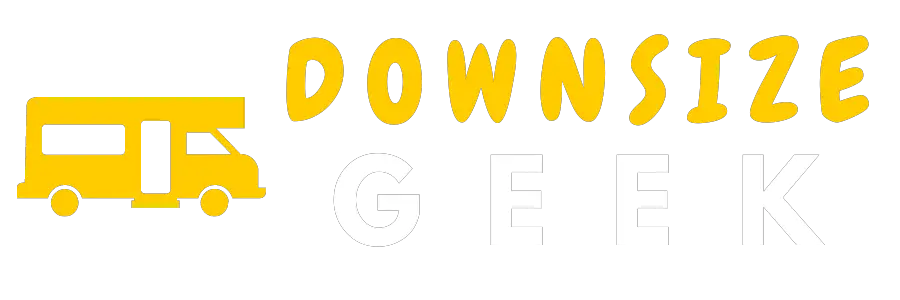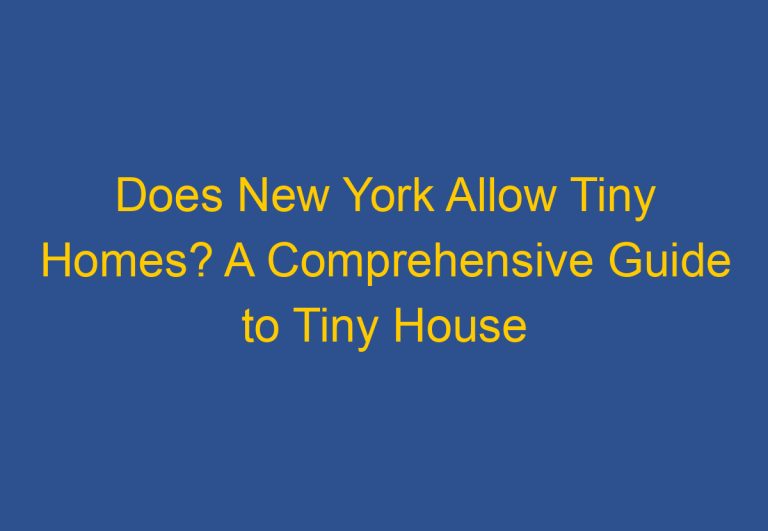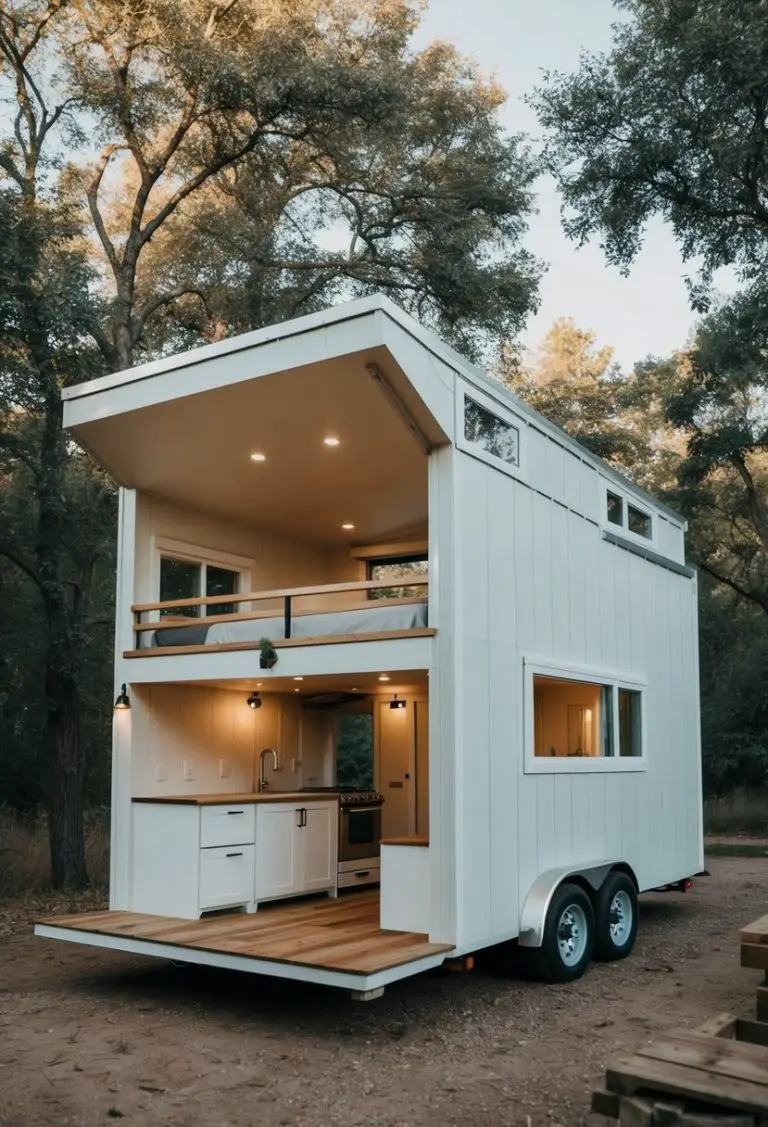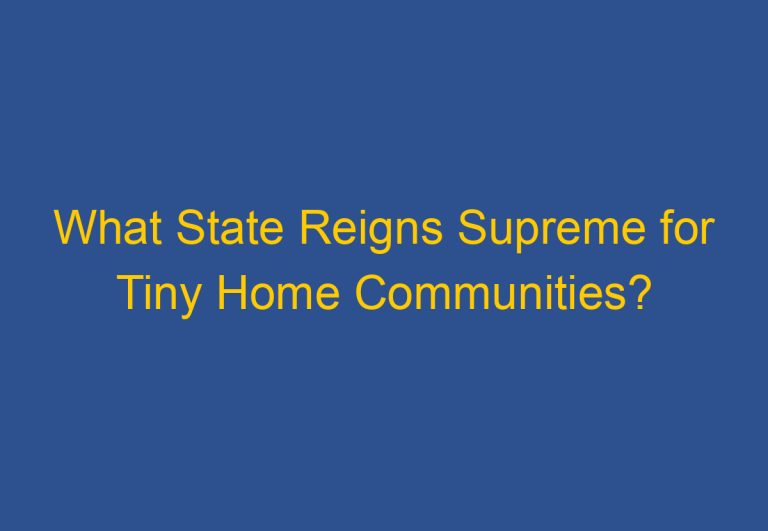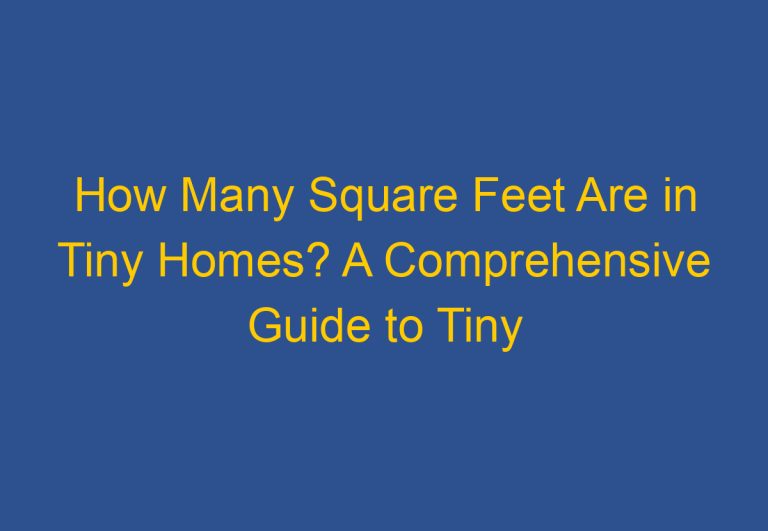How Much Does a Tiny House Cost in USA? A Comprehensive Guide
Tiny houses have become increasingly popular in the United States in recent years, with many people opting for this affordable and minimalist lifestyle. However, one of the most common questions people have when considering a tiny house is how much it will cost. The answer to this question can vary greatly depending on a number of factors, including the size of the house, the materials used to build it, and the location.
According to recent research, the average cost of a tiny house in the United States is around $46,670. However, this number can be much lower or higher depending on a variety of factors. For example, a very small, simple house that is DIY-built could cost as little as $6,100. On the other hand, a luxury tiny house with many amenities could cost as much as $240,000. It’s important to keep in mind that the cost of a tiny house also includes the cost of land, utilities, and other expenses that come with homeownership.
Cost Breakdown of Tiny Houses
When it comes to tiny houses, the cost can vary greatly depending on various factors such as size, location, construction, customization, and additional expenses. In this section, we will break down the cost of tiny houses into different subsections to help you understand the breakdown of costs.
Base Price and Size Variations
The base price of a tiny house can vary greatly depending on the size and type of house. The average cost of a tiny house in the USA is between $20,000 to $150,000. The size of a tiny house can range from 100 to 400 square feet. Tiny houses can either be built on a foundation or on wheels, with the latter being more affordable. The cost of a tiny house on wheels can range from $4,000 to $80,000, while a tiny house on a foundation can cost between $50,000 to $140,000.
Land and Location Factors
The cost of land and location can greatly affect the cost of a tiny house. Zoning laws, property taxes, land costs, and real estate prices can all impact the final cost. It is important to research the location and any zoning laws before purchasing land for a tiny house. Additionally, the cost of utilities and amenities such as water, electricity, and sewer systems can vary depending on the location.
Construction and Customization
The cost of construction and customization can vary depending on whether you choose to build the tiny house yourself or hire a contractor. DIY tiny house builders can expect to spend between $20,000 and $40,000 for materials. Pre-built tiny houses tend to have a higher price tag due to the labor and expertise involved. The average cost for a pre-built tiny house can range from $50,000 to $100,000, depending on the size and features.
Additional Expenses
Additional expenses for a tiny house can include appliances, furniture, and decor. Solar panels and composting toilets are popular sustainable options that can add to the cost. It is also important to consider the cost of permits, inspections, and insurance.
Ownership and Recurring Costs
Tiny house ownership comes with recurring costs such as maintenance, utilities, and insurance. It is important to factor in these costs when considering the affordability of a tiny house. Additionally, property taxes and mortgage payments may still apply depending on the location and type of tiny house.
Price of Alternative Tiny House Options
Alternative tiny house options such as shipping container homes and prefabricated homes can also be considered. These options may be more affordable and offer unique design opportunities. Upcycled materials and used tiny homes are also options to consider.
Financing and Savings Opportunities
Financing options for tiny houses include personal loans, land loans, and mortgage loans. Good credit scores can increase the chances of approval and lower interest rates. Saving money by building a tiny house yourself or using affordable materials can also help reduce costs.
Comparing with Traditional Housing
When comparing the cost of a tiny house to a traditional home, it is important to consider the long-term costs of ownership and upkeep. Tiny houses offer an affordable option for those looking to downsize and live a minimalist lifestyle. However, traditional homes may offer more space and amenities for those who can afford the high housing costs.
In conclusion, the cost of a tiny house can vary greatly depending on various factors such as size, location, construction, and customization. It is important to research and factor in all costs before deciding on purchasing or building a tiny house.
Lifestyle and Practical Considerations
Mobility and Legal Aspects
One of the main selling points of tiny houses is their mobility. Most tiny houses are built on wheels or trailers, allowing owners to move their homes from place to place. However, it’s important to note that not all states allow tiny houses on wheels or have specific zoning laws that regulate them. Before embarking on the tiny house lifestyle, it’s important to research the legal aspects of tiny house living in the desired area.
Living Space and Design Choices
Tiny houses offer a unique opportunity to customize living space and design choices. With limited square footage, it’s important to make the most of every inch of space. Many tiny house owners choose to incorporate features such as multi-functional furniture, lofted sleeping areas, and large windows to maximize natural light. Building or buying a tiny house also allows for customization of the floor plan and design to fit the owner’s specific needs and preferences.
The Tiny House Community and Culture
The tiny house movement has gained a lot of attention in recent years, with a growing community of individuals embracing the minimalist lifestyle. This community offers support and resources for those interested in downsizing and living in a tiny home. Joining the tiny house community can also provide opportunities for networking, sharing ideas, and finding like-minded individuals.
Environmental Impact and Sustainability
Tiny houses are often built with sustainability in mind, using upcycled materials and incorporating features such as composting toilets and solar panels. Living in a tiny house also promotes a minimalist lifestyle, reducing the amount of waste and energy consumption. For those interested in reducing their environmental impact, a tiny house can be a great option.
Long-Term Commitment and Flexibility
While the tiny house lifestyle can be appealing, it’s important to consider the long-term commitment and flexibility required. Living in a tiny house requires a significant downsizing of possessions and a willingness to adapt to a smaller living space. It’s also important to consider the potential need for upgrades or modifications over time.
Maintenance and Upkeep
Like any home, tiny houses require regular maintenance and upkeep. This includes regular cleaning, maintenance of utilities, and potential repairs. It’s important to have a plan in place for these tasks and to budget accordingly.
In summary, tiny houses offer a unique opportunity for customization, sustainability, and mobility, but it’s important to consider the legal aspects, long-term commitment, and maintenance required. Joining the tiny house community can provide support and resources for those interested in downsizing and embracing a minimalist lifestyle.
Frequently Asked Questions
What is the average cost to build a tiny house in the United States?
The cost of building a tiny house in the United States varies depending on multiple factors such as size, location, materials, and features. According to the search results, the average cost of building a custom tiny house ranges from $50,000 to $140,000, while a prefab tiny house costs between $4,000 to $80,000+. However, the cost can go up or down depending on individual needs and preferences.
How much does a 2-bedroom tiny house typically cost?
The cost of a 2-bedroom tiny house can vary depending on the size, materials, and location. According to the search results, the average cost of a tiny house in the United States ranges from $10,000 to $150,000. However, the cost of a 2-bedroom tiny house can be higher than this range depending on individual needs and preferences.
What are the costs associated with purchasing a tiny home on wheels?
The cost of purchasing a tiny home on wheels can vary depending on the size, materials, and features. According to the search results, the cost of a pre-built tiny house can range from $50,000 to $100,000, while the cost of building a tiny house on wheels can range from $30,000 to $60,000. Additionally, there are other costs associated with purchasing a tiny home on wheels such as permits, insurance, and maintenance.
Is it generally more affordable to construct a tiny house yourself or to purchase a pre-built one?
The cost of constructing a tiny house yourself can be lower than purchasing a pre-built one, but it depends on individual skills and preferences. According to the search results, DIY tiny house builders can expect to spend between $20,000 and $40,000 for materials, while pre-built tiny houses tend to have a higher price tag due to the labor and expertise involved.
What is the cost per square foot for a tiny house in the US?
The cost per square foot for a tiny house in the US varies depending on the materials and features. According to the search results, the cost of a tiny house foundation ranges from $5.50 to $8 per square foot, or $6,000 to $9,000. However, the cost can go up or down depending on individual needs and preferences.
Which state offers the most cost-effective options for buying tiny homes?
The cost of buying a tiny home can vary depending on the state. According to the search results, some states such as Texas, Florida, and California offer cost-effective options for buying tiny homes. However, it is important to consider other factors such as zoning laws, building codes, and availability of resources before making a decision.
